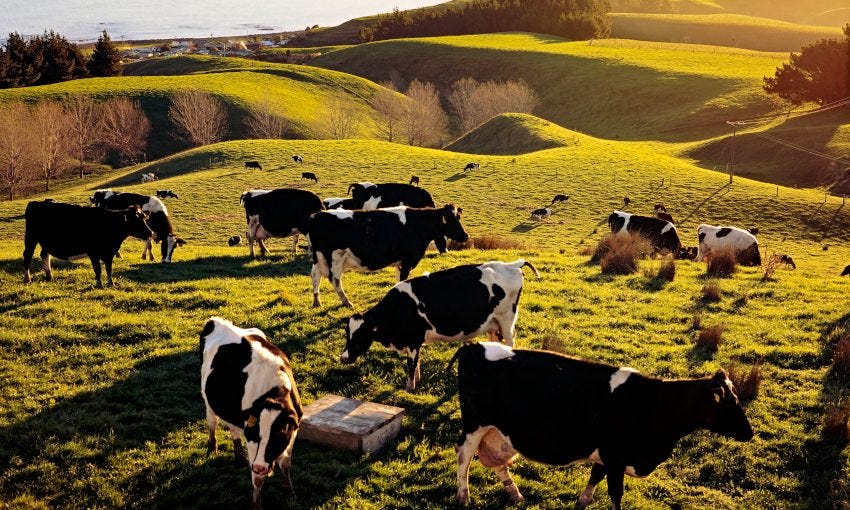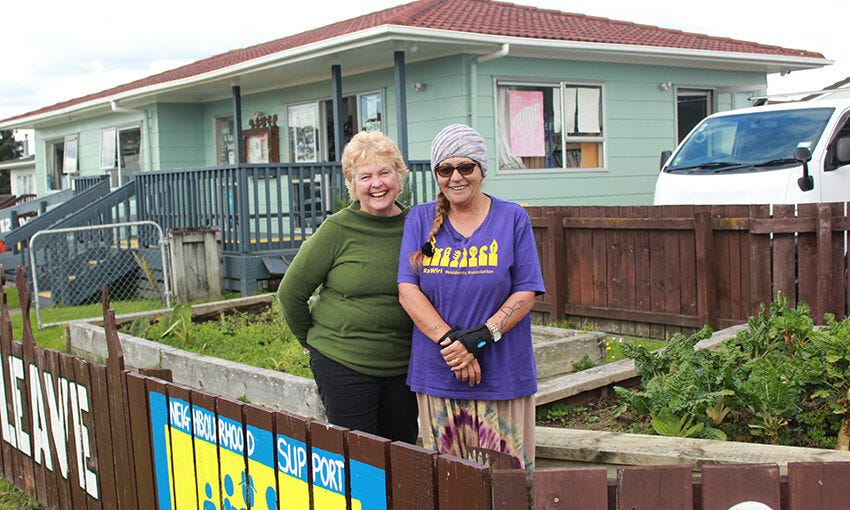
Good morning and welcome to The Bulletin for Friday 25 September, by Alex Braae for The Spinoff. Presented in partnership with Z Energy.
In today’s edition: Focus on the various farming plans put out this week, concerns raised about contacts of new positive Covid cases, and huge bill coming for Wellington region water.

(Getty Images)
For a lead story today, a look at the various farming policies that will be taken into the election. In the post-Covid economy, it's a pretty crucial sector, and in economic, social and environmental senses it covers a lot of areas. I spent a big chunk of yesterday driving around Southland in a van with a bunch of people – some of whom were farmers, and that'll inform a bit of the commentary here.
First, the Labour Party plan: Radio NZ reports the party intends to put $50 million towards environmental change efforts and reducing compliance costs on farmers. That second part is important – basically what is being offered is a streamline process that will fold various compliance requirements into one integrated farm plan. That could take away some of the headaches for farmers – as one put it yesterday, a 5 minute job can sometimes result in 45 minutes of paperwork. Apparently one of the booming industries in the agricultural sector right now is compliance consulting, because of the complexities. In terms of the big dollar figure, that is less than the $300 million being pitched by the Greens to introduce more environmentally friendly and regenerative practices.
National meanwhile are promising to reduce that burden by simply repealing a lot of the more onerous regulations. Newsroom's Sam Sachdeva has looked it over, and one area in particular is around freshwater standards that have recently been introduced. They've also focused their policy around RMA reform, and on introducing a new 'primary sector visa' for skilled workers. It remains a crucial voter base for National to turn out in big numbers if their vote share is going to go up. Act also released an agriculture policy this week, which included their pitch to repeal both the Zero Carbon act and the emissions trading scheme, along with reforming how methane emissions are measured.
One point that came up in discussion yesterday was around the toll that mental health issues are taking on the sector. There was a useful article on this recently in the Southland Times, with morale in the sector being very low, and government regulations being blamed in large part. The problem was put to me like this: farmers who had been doing the right things to improve their environmental performance were suddenly finding that new regulations would be seemingly impossible to meet. One second generation farmer also expressed a fervent desire for his kids to take over from him one day, but worried about whether there was a future in it.
In terms of reaction to the plans, Federated Farmers were positive about a lot of it. The Feds said the week "started with an excellent agriculture policy from ACT announced on Monday, followed by Labour’s positive farm plan policy...and finishing today with a well-researched and well thought out National party agriculture and horticulture policies today. Environmental group Choose Clean Water however raised concerns with both National and Labour's plans.
Finally, if you want to compare all the parties, you know where to go: Policy has guides for how all parties will respond to climate adaptation, freshwater management, emissions reduction, and economic policy around agriculture. Like I said, it touches a fair few different areas.
Concerns are being raised about close contacts of the three new cases of community transmission yesterday. They met with people from around New Zealand before realising they were infected – those contacts are now being traced and going into self-isolation. As our live updates reports, there is also a long list of locations of interest around Auckland, Frankton, Taupō and Tokoroa that those confirmed cases visited – we've got it in the article. Anyone who visited one of these locations is considered a “casual contact” and is not required to self-isolate or get tested unless they feel unwell or start to develop Covid-19 symptoms.
Councils in the Wellington region are facing eye-wateringly large bills to upgrade water network infrastructure. Radio NZ's Harry Lock reports the bill facing Hutt City has been put at $1.3bn over several decades, and up the road Porirua is looking at more like $2bn. That it is stretching into the billions at all has come as something of a nasty surprise for the Hutt, says mayor Campbell Barry, even if it was always clear the bill would be large.
The Financial Markets Authority is warning financial service firms that aren't up with compliance that they're about to start getting the stick, reports Business Desk's (paywalled) Dan Brunskill. FMA chief executive Rob Everett said he's running out of patience with those who haven't been proactive, and if customers end up getting harmed, court action is becoming more likely. In fact, in some cases they may even go after those working with sloppy practices even if they can't identify any specific victims.
It turns out the wealth tax won't actually be a bottom line for the Greens in coalition negotiations after all, leaving the party with zero confirmed bottom lines. Co-leader James Shaw went on Radio NZ yesterday to hose down a suggestion from MP Julie Anne Genter that it would be, saying that she had misspoke in the heat of the moment, and it was merely one of several top priorities. Shaw says the party will reassess its negotiating position once the votes are counted.
To mark Mental Health Awareness week, former National leader Todd Muller has opened up on the intensity and frequency of the panic attacks he suffered. Newshub has reported on his candid Facebook post, which also details the help he is now getting to recover. Bay of Plenty Times (paywalled) journalist Kiri Gillespie interviewed him last month, and says now that he is using his public profile for a greater good – I wholeheartedly agree.
Got some feedback about The Bulletin, or anything in the news?
Drop us a line at thebulletin@thespinoff.co.nz

Right now on The Spinoff: The Side Eye returns with a piece about how to draw Act leader David Seymour.Breast Cancer Foundation CEO Evangelia Henderson writes about what the next government must do to prevent deaths and improve outcomes. Leonie Hayden puts the spotlight on Te Tai Tokerau, a seat where times have long been tough for many. Ben Thomas writes about how minor parties in government influence the tone, and how the Māori Party helped change National for the better. Justin Latif writes about the Rawiri Community House, a hugely important south Auckland community service provider, and the unlikely friendship that keeps it going. And Dr George Laking gives four crucial needs for a healthy population, based on what those on the frontlines are seeing.
For a feature today, something I've been listening to: I've had a bit of time on the road recently, and a lot of it has been in areas where the radio reception isn't great. So one podcast that has been very good to chew through is the History of Aotearoa New Zealand show, with short sharp episodes about events going back to the very first arrival of people in this land. I'd particularly recommend episode 5 – a dramatic retelling of the Great Fleet migration.
The All Blacks probably won't be home for Christmas, under the new Rugby Championship schedule.Stuff reports NZ Rugby is furious, with the last game of the season set down for December 12 – factor in the mandatory two weeks of managed isolation back home from Australia, and you'll see the problem. The schedule hasn't yet been agreed to by NZ Rugby. Of course, it could all become something of a moot point – Covid-19 is still running absolutely rampant in South Africa and Argentina, and while they're committed to sending teams, not a lot of sport has gone to plan this year.
That's it for The Bulletin. If you want to support the work we do at The Spinoff, please check out our membership programme




